|
|
|
Sort Order |
|
|
|
Items / Page
|
|
|
|
|
|
|
| Srl | Item |
| 1 |
ID:
081481


|
|
|
|
|
| Publication |
2008.
|
| Summary/Abstract |
Economic globalisation, coupled with geopolitical instability and international terrorism, has made it impossible for any single country to secure its energy supply entirely on its own. The urgent energy security issue has resulted in brisk energy diplomacy with aspirations for cooperation running high among both producing and consuming countries. The concept of energy security needs to be expanded, however, because the real risks are not 'below ground' (a lack of resources) but 'above ground' (political instability). We need a new energy security concept to ensure global energy security. India and China can take the lead by finding ways to cooperate on energy rather than taking adversarial positions. The article reasons that with clearer identification of shared interests, China and India together can help strengthen Asian unity, stability and prosperity and thus significantly contribute to the world order
|
|
|
|
|
|
|
|
|
|
|
|
|
|
|
|
| 2 |
ID:
178750


|
|
|
|
|
| Summary/Abstract |
China’s oil investment in Central Asia from the late 1990s was not driven by energy needs or geopolitical ambitions, like many assumed. The real concern was the safety of its western boundary, while energy was used as an instrument to forge political ties with its neighbours. However, China has become one of the key geopolitical players in Central Asia after more than 20 years engagement, and many observers are keen to find out why has Beijing failed to escape the grand games while focusing on energy diplomacy? And, what is the implications of China’s new status in Central Asia on its Belt and Road Initiative (BRI)? This article attempts to answer the questions via reviewing China’s energy diplomacy towards Central Asia, from the lens of geopolitics. Focusing on China’s dealing with Kazakhstan and Turkmenistan, as well as the Russian factor, the research has revealed the main reasons that led China into the grand games: the entangling of politics and China’s energy engagements; the establishment of the Shanghai Cooperation Organization; and the changes of the pipeline map. China’s geopolitical gains have mainly made at the cost of Russia, though the latter chose to accept Beijing’s greater presence in Central Asia against the changed circumstances. The launch of the BRI scheme has amplified China’s geopolitical significance in Central Asia, but also triggered various criticisms, including the debt traps and governance-related issues. China’s dealing with the Muslims in Xinjiang was also a point of disagreement. Beijing may need to revisit its pragmatic featured diplomacy, and to take a more liberal approach to accommodate different political perspectives. With greater power potential, Beijing should bear more responsibilities to ensure peace and stability in Central Asia, together with other powers, not only for the sake of BRI’s success, but also for the interest of the mankind.
|
|
|
|
|
|
|
|
|
|
|
|
|
|
|
|
| 3 |
ID:
132627


|
|
|
|
|
| Publication |
2014.
|
| Summary/Abstract |
Within the last twenty years, China has become dependent on import of coal, oil and natural gas. Especially oil is now an economic and a security concern by the Chinese regime and key international stakeholders. Until 2035, China will account for one fourth of the global net growth in global gas consumption and more than half of the net growth in oil consumption. The future demand cannot be covered by China×s own conventional and unconventional sources. Pipelines from neighboring countries can cover more than half of the needed import of natural gas by 2030, but only 10 percent of the import demand of oil is secured so far. Even if China attempts to address its insufficient supply of oil by increased investments in overseas oil fields, there is still a large gap. Furthermore, the oil import will largely come from politically unstable countries and regions, and the bulk of the supplies must be shipped through the potentially insecure Hormuz and Malacca Straits. The ongoing territorial disputes with neighboring countries regarding areas with gas and oil reserves in contested waters bear evidence to regional conflict potentials, and China appears to engage more actively in energy diplomacy and regional cooperation.
|
|
|
|
|
|
|
|
|
|
|
|
|
|
|
|
| 4 |
ID:
137185
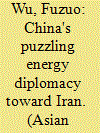

|
|
|
|
|
| Summary/Abstract |
China, the world's largest energy consumer, has sought to build up its ties with all energy-rich countries. But China's energy diplomacy toward Iran, one of its largest oil suppliers, is puzzling. On the one hand, China has gone all out to strengthen its ties with Iran in spite of international efforts to isolate Iran because of its controversial nuclear program. On the other hand, China not only has voted against Iran at the International Atomic Energy Agency and the United Nations Security Council on the nuclear issue, but also has cut its oil imports from Iran. The main explanation for this apparent contradiction is US pressure. China has yielded to the pressure because the United States and its allies are much more important for China's economic development and energy security than is Iran.
|
|
|
|
|
|
|
|
|
|
|
|
|
|
|
|
| 5 |
ID:
081281
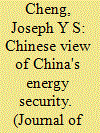

|
|
|
|
|
| Publication |
2008.
|
| Summary/Abstract |
This article attempts to examine how China perceives its energy security issues. A survey of its research on energy issues offers hints on how experts influence the Chinese leadership. This article briefly looks at the assessment of the energy situation in China and the policy programmes released to tackle the problems. It then analyses the policy programmes and evaluates the overall strategy. It mainly relies on published data from China to reflect a Chinese view. China in some ways would like to follow Japan's example in response to the international oil crises in the 1970s, i.e. upgrade its industrial structure, introduce energy conservation measures, develop new sources of energy supply, and engage in an 'energy diplomacy' to diversify and guarantee its energy supply.
|
|
|
|
|
|
|
|
|
|
|
|
|
|
|
|
| 6 |
ID:
077277


|
|
|
| 7 |
ID:
103147
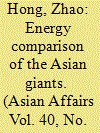

|
|
|
|
|
| Publication |
2009.
|
| Summary/Abstract |
This article seeks to evaluate the impact of India and China on world energy markets by setting their future energy demands, principally for coal and oil, in the context of their domestic supply potential. After examining their approach to energy efficiency, the author concentrates on their energy diplomacy and the way in which they have sought to enhance their security of supply by targeting exporting countries, often those with a somewhat fraught relationship with the west. He concludes that it is in their interest to further strengthen their co-operation and avoid competition which simply drives up the price they pay for oil.
|
|
|
|
|
|
|
|
|
|
|
|
|
|
|
|
| 8 |
ID:
094807
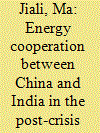

|
|
|
| 9 |
ID:
142064
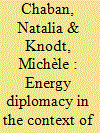

|
|
|
|
|
| Summary/Abstract |
This paper examines a supranational actor, the European Union (EU), as a producer of energy diplomacy. This study uses a comparative analytical framework of state-centred vs. multistakeholder diplomacies to explore EU energy diplomacy towards the ‘emerging’ powers of Brazil, India, China and South Africa (BICS). It also elaborates the multistakeholder model by advocating the inclusion of a new element – a consumer of diplomatic actions – into its conceptualization. In this way the paper suggests a new synthesis of the concepts of multistakeholder and public diplomacies. Advancing the notion of energy diplomacy, our analysis suggests that this type of diplomacy goes beyond state actors as producers of diplomatic outcomes, and is no longer confined to the norms of security of supply and competitiveness; EU energy diplomacy is a complex blend of multistakeholder and state-centred diplomacies, participants (producers and consumers) and communication modes. This comprehensive approach to diplomacy – led in the EU’s case by norms of sustainability, competitiveness and security of supply – is a response to the challenges of global governance, multipolarity and multinational cross-sectoral networks.
|
|
|
|
|
|
|
|
|
|
|
|
|
|
|
|
| 10 |
ID:
101873
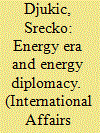

|
|
|
|
|
| Publication |
2010.
|
| Summary/Abstract |
INTERNATIONAL AFFAIRS and Srecko Djukic, a prominent Serbian diplomat and man of letters, have been maintaining strong friendly ties. As a member of Serbia's embassy staff in Moscow during several years in the past he used to come to our office for interviews and discussions on political and literary subjects which were always interesting. Dr. Djukic has been posted since as Serbia's Ambassador Extraordinary and Plenipotentiary to Minsk, the Republic of Belarus. From Minsk, he was sending us his articles that appeared in the journal. His latest book VRéME ENERGIJE. Više od Diplomatije [ENERGY TIME. More than Diplomacy] was recently published in Belgrade. This is a revealing view of a diplomat on the pressing subject. We agreed with the ambassador for an interview to cover the issues raised in his book and other aspects of European and international power industry.
|
|
|
|
|
|
|
|
|
|
|
|
|
|
|
|
| 11 |
ID:
128708


|
|
|
|
|
| Publication |
New Delhi, Manak Publications Pvt.Ltd., 2013.
|
| Description |
xvi, 248p.Hbk
|
| Standard Number |
9789378313271
|
|
|
|
|
|
|
|
|
|
|
|
Copies: C:1/I:0,R:0,Q:0
Circulation
| Accession# | Call# | Current Location | Status | Policy | Location |
| 057671 | 333.790954058/DOR 057671 | Main | On Shelf | General | |
|
|
|
|
| 12 |
ID:
128826
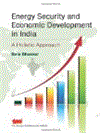

|
|
|
|
|
| Publication |
New Delhi, The Energy and Resources Institute (TERI), 2013.
|
| Description |
xviii, 353p.Hbk
|
| Standard Number |
9788179934609
|
|
|
|
|
|
|
|
|
|
|
|
Copies: C:1/I:0,R:0,Q:0
Circulation
| Accession# | Call# | Current Location | Status | Policy | Location |
| 057660 | 333.790954/BHA 057660 | Main | On Shelf | General | |
|
|
|
|
| 13 |
ID:
170565
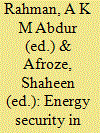

|
|
|
|
|
| Publication |
Dhaka, Pathak Shamabesh, 2016.
|
| Description |
184p.: figures, tableshbk
|
| Standard Number |
9789849153108
|
|
|
|
|
|
|
|
|
|
|
|
Copies: C:1/I:0,R:0,Q:0
Circulation
| Accession# | Call# | Current Location | Status | Policy | Location |
| 059846 | 333.79052/RAH 059846 | Main | On Shelf | General | |
|
|
|
|
| 14 |
ID:
153344


|
|
|
|
|
| Summary/Abstract |
Focusing on natural gas and pipeline infrastructures, and adopting the concept of “forms of state”, the article examines the transformation of energy security politics in Europe. Three state models, with their related pattern of energy diplomacy, are sketched: the partner state, which describes the original politics of the European gas market; and the provider state and catalytic state, which describe two alternative possibilities of the emerging politics in the new institutional and ideational context promoted with the establishment of the internal energy market and the development of the EU’s external energy policy. By analysing the politics of pipeline in Southeastern Europe, the article argues that the catalytic state model with its related pattern of network energy diplomacy is more appropriate than the provider state model, supported by the market approach and its related pattern of multilateral diplomacy, to conceptualise the equilibrium emerging from the transformation of the previous system.
|
|
|
|
|
|
|
|
|
|
|
|
|
|
|
|
| 15 |
ID:
094366
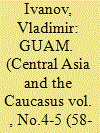

|
|
|
| 16 |
ID:
169505
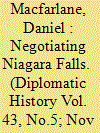

|
|
|
|
|
| Summary/Abstract |
Niagara Falls is one of the world’s most iconic natural features. Yet in many ways Niagara Falls is decidedly unnatural, for the United States and Canada physically manipulated this waterfall over the course of the twentieth century so that its waters could be diverted for hydropower production while still ostensibly retaining the cataract’s aesthetic beauty for tourism. While this appears contradictory, since the latter depends on ample amounts of water flowing over the Falls while the former requires water going around the Falls, experts believed that they could engineer a compromise and essentially fool the public. Following the 1950 Niagara River Diversion Treaty, the two North American nations constructed hydroelectric stations and remedial works (various engineering interventions including excavations, fills, reclamations, weirs, and dams) at Niagara Falls that allowed for the majority of the water volume to be diverted for power production. Moreover, the largest of the Niagara cataracts, the spectacular Horseshoe Falls, was reshaped in an effort to hide the fact that the majority of the Niagara River’s water volume was abstracted.
|
|
|
|
|
|
|
|
|
|
|
|
|
|
|
|
| 17 |
ID:
108194


|
|
|
| 18 |
ID:
166707
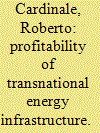

|
|
|
|
|
| Summary/Abstract |
This paper explores how the profitability of European transnational gas infrastructure is affected by (i) alternative ways to organize the gas supply chain; and (ii) different forms of energy diplomacy. In particular, through a case study, the paper analyses how these factors determined the realisation and success of the Greenstream pipeline and the stalemate of the Galsi pipeline, despite the potential for both projects to be profitable. The issue is important in view of the full transition to the EU Single Market, of which unbundling and privatisation are policy pillars. In fact, before the transition, vertical integration in the foreign upstream and energy diplomacy were key elements for infrastructure profitability. The paper argues that these elements are still important, as constraints to gas procurement and binding contractual relations with producers have not changed substantially. Nevertheless, securing those advantages within the EU Single Market framework requires significant innovations. In particular, the paper suggests forms of EU energy diplomacy, based on bilateral trade deals, which could achieve forms of vertical integration for energy firms as well as help EU and non-EU counterparts align their interests. This paper may prove particularly relevant for the recent debate on how to shape EU energy diplomacy.
|
|
|
|
|
|
|
|
|
|
|
|
|
|
|
|
| 19 |
ID:
146539
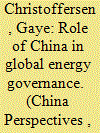

|
|
|
|
|
| Summary/Abstract |
Global energy governance institutions pressure China, which has ungoverned domestic energy spaces, to reform and strengthen its capacity for domestic energy governance. Rather than reform, China has attempted to create an alternative global energy order and establish a leadership role using the BRICS framework. However, BRICS exist in the global ungoverned energy space and have not prioritised energy governance. Additionally, BRICS practice shared leadership, undermining potential Chinese leadership. Beijing has subsequently shifted to the “Silk Road Economic Belt,” a vehicle for uncontested Chinese leadership in energy.
|
|
|
|
|
|
|
|
|
|
|
|
|
|
|
|
| 20 |
ID:
088763


|
|
|
|
|
| Publication |
2009.
|
| Summary/Abstract |
This paper aims first to illuminate the key aspects of Russia's energy diplomacy toward the EU and how the EU copes with it and then to apply the pattern found in Europe to Northeast Asia and compare the differences. In Europe, Russia has been quite effective in consolidating its dominant position as energy suppliers, and has been equally successful in nullifying the EU's collective attempts to produce a united front by forming individual energy relationships with various EU member states. A strategy of 'divide-and-rule' has been at the center of Moscow's energy diplomacy toward Europe. In Northeast Asia, by contrast, the progress of energy cooperation between Russia and Northeast Asian countries has been slower than both sides initially hoped. Overall, it could be attributed to Russia's failure to gain the trust of Northeast Asian countries in the course of its energy diplomacy under the Putin administration.
|
|
|
|
|
|
|
|
|
|
|
|
|
|
|
|
|
|
|
|
|